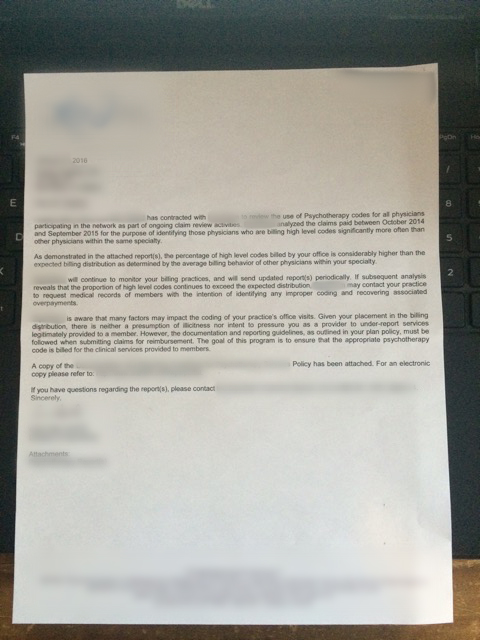Insurance Companies: Who should dictate best practices and how care is delivered?
I recently shared my own saga with BCBS (if you missed it, you can read about it here)… But it isn’t limited to BCBS or to my own experience.
Last week, a therapist from New England who I’ve been coaching sent me this:

I had to write the therapist back to find out what it even meant. And though it says the letter is not meant to “pressure you as a provider to under-report services,” it sure comes across to me that way.
It seems to be saying: either you shorten your sessions or we will audit you.
That sounds like not only a threat, but more insidiously, like an insurance company trying to dictate how therapy is delivered.
Basically what happened here, was that this therapist is seeing clients weekly for 55-60 minute sessions and billing one, 90837 per week, per client. That doesn’t seem excessive to me. Nor does it seem like inappropriate care given what I know about this therapist’s practice. But the insurance company apparently thinks that hour-long sessions are excessively long and would prefer we all stick to quickies – 30- or 45-minute sessions.
I am a psychodynamically- and attachment-oriented therapist, plus I offer EMDR. What that means for me is that I offer 55-minute sessions. And when I do EMDR, 90-minute sessions are often more appropriate and effective.
But if I were still working within insurance networks, I would probably get flagged too.
Insurance companies would try to tell me how to do therapy.
And this is where I get a little pissed off.
As therapists, we go to grad school. We delve into how we can best help our clients. We get years of supervision. We take licensing exams. We get continuing education every year. We constantly consult with other experts about cases. And then someone who is not a therapist, someone who is simply a numbers person, tries to tell us what is best care? Really, they are talking about economic issues, not mental health issues or getting our clients to a place of wellness and functionality… or really where most of us are probably aiming – getting our clients to a place where they are thriving in their lives.
I get the dilemma here – that clients pay for insurance and then to not be able to use it, is frustrating and financially challenging. But insurance does typically cover out-of-network providers, just at a different level or rate. And the more important question that comes to my mind is: where is our voice as a profession? How can we find ways, big or small, to stand up and say this is not okay? We are out here helping people, providing best care, changing people’s lives.
For my piece, it was leaving the networks and building a community of therapists with whom I work, in order to empower them to build practices where they get to determine how to best help their clients – based on the research they read, based on their theoretical orientation, based on their unique style, based on the needs of their clients, NOT dictated by an outside company whose bottom line is their top priority.
Send me your stories and letters about how you’ve stood up for the care of your clients (or of how insurance companies have tried to dictate that care).
Let’s talk about this… and let’s take charge of our practices so we can continue helping people in the ways we know are best and so we can take care of ourselves too in the process.
Hi Evan:
We have had the same letter in California. Our association stated we should do the following: Make sure we list the start and end time on each note. the 90837 is 52 mins. So I work in a 52-55 min session I deal with trauma and depression and that amount of time is how I work with all my clients. Insurance or not. 2. We need as a therapist to know why we work the way we do. Why doe as longer session make sense. 3. Good note taking is the key if their is an audit. 4. Many folks are feeling it’s a way to reduce the fees because therapists will cave. Not I nor my counseling center. we do great work and we will do a 52 mins. session.
Thank you for the comment, Sherry. I agree – good notes are key. And yes, making sure your start and finish time are on each note is the piece that will make an audit pass. Glad to hear you are keeping up the good work!